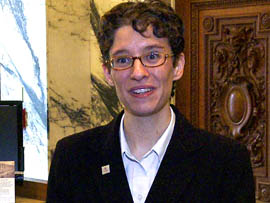Cronkite News has moved to a new home at cronkitenews.azpbs.org. Use this site to search archives from 2011 to May 2015. You can search the new site for current stories.
Supreme Court refuses to consider Arizona case on domestic-partner benefits
WASHINGTON – The Supreme Court on Thursday let stand lower court rulings that blocked an Arizona law denying healthcare benefits to domestic partners of state employees.
Gay-rights groups had claimed the policy discriminated against same-sex couples in Arizona, a charge state officials disputed. But lower courts had agreed that the law discriminated against gays, and the Supreme Court refused to intervene.
The high court’s decision came just one day after it handed gay-rights groups victories in two closely watched cases on same-sex marriage.
State officials called the latest ruling “ill-advised” and said it was a “fiscally unsound” intrusion on their authority.
But an attorney for the state employees who challenged the law said she was “thrilled” by the result.
“We are thrilled and eager to work on the next chapter of this fight,” said Tara L. Borelli, the attorney, who said the next step is “to make sure the benefits remain in place permanently.”
The case stems from a part of Arizona law, known as Section O, that limits state benefits to the workers, their spouses and their dependent children. The 2009 law reversed state policy from a year earlier that had extended benefits to the employee’s domestic partner, whether of the same or different gender.
The state said that expanding benefits to domestic partners covered about 800 employees and added about $4 million to the budget in 2008.
When Section O was proposed a year later, it was done to help close a massive state budget gap, said officials, who argued that it applied to workers with opposite-sex partners as well as those with same-sex partners.
But a group of gay state employees sued to block the law, which was set to take effect in 2011. They argued that the law was discriminatory because, unlike heterosexual couples in the state, gay couples could not get married under Arizona law to get benefits for their partners.
A district judge agreed that the law violated the equal protection rights of gay workers and blocked it before it could take effect. The injunction was upheld and the state’s appeal to the Supreme Court was brushed aside without comment Thursday, leaving the district court injunction in place.
Gov. Jan Brewer said in a prepared statement Thursday that the courts had “undercut the ability of duly-elected state officials to make decisions critical to managing the state budget.”
“This case has never been about domestic partners, same-sex or otherwise,” Brewer said in the statement. “It is always been about the authority of elected state officials to make decisions with which we have been entrusted by the voters.”
“I’m disappointed the high court has eroded that authority today,” she said.
A spokeswoman for the Arizona Attorney General‘s office said the office is “considering options on whether or not to proceed in this case.”
But Borelli said there is nothing to consider.
“Now the Supreme Court has turned down their request to review the preliminary order, it means the fight is over, period,” said Borelli, who called the decision “the end of the road for the government to avoid providing benefits.”
She said the question has shifted to whether “the state has to maintain the family coverage on an ongoing permanent basis once the case is over.”
Borelli said she believed the affected state employees “are incredibly relieved that they are not in danger of losing their benefits.”
“Having access to health coverage is important and urgent for many families, the state shouldn’t be putting them under the stress of worries,” she said.








